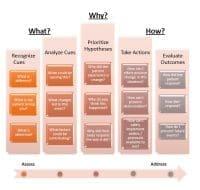Food for thought: Rather than dining on our young, how might we—the next generation of nurse leaders—model positive professional behaviors and help to end the hazing, the bullying, the eye rolling, and all the other covert and overt intimidation that has plagued our profession for decades. A mentor once said to me, “Physicians groom their young and teach them early that they are the leaders of the healthcare team.” I do not for the life of me remember ever being conveyed the message that I was to lead anything but a code blue in the event that I would be asked to do so. However, I do remember being told, “You are the coordinator of care…you are in charge of your patients…and if anything goes wrong, you will be blamed, so cover your behind!” I suppose that was one way of saying to me that I am the captain of my ship.
I made it through nursing school with just a hint of PTSD, unscathed, and ready for action. The bit of confidence I gained from having passed the grueling boards was enough to last me my first week of orientation as a new grad. But was training and validation of skills enough to make a rookie nurse not jump out of her seat in the middle of charting when shot with the, you’re-in-my-chair look from senior nurse Grumpy or doctor McCrabby? Back then my safe zone was at the bedside, developing a therapeutic relationship with my patients away from the drama at the nurses’ station. This was where I felt empowered—caring for another human being and helping an individual get through a vulnerable moment in time. Whether or not my patients were receptive or resistant, I was sure to do my best to advocate for them.
I fondly remember my preceptor, the only seasoned peer who offered any encouragement those first 8 weeks of sucking it up and holding back the tears. She said to me, “You learn quick. You’re a smart one. You really care about your patients.” Her kind words still resonate with me, as she was my lifeline that first year out of the gate. I paid close attention to her attitude and behaviors, as she modeled professionalism. Despite the prevalent culture of incivility among our colleagues, her work ethic and integrity were of the highest standard. The rest of my bittersweet memories as a novice nurse, now healed from the past bullying and hostile environment, is fuel for my passion to lead and mentor all nurses and future nurse leaders.
My goal is to create an environment of psychological safety in my setting, which fosters accountable, caring, compassionate, professional behaviors. In my recent poll for thoughts from a convenience sample of nurse leaders, I found the sentiment is that we are starting to move in the right direction in curbing nurse incivility but there is opportunity for growth among leaders. Here are some soundbites to chew on:
- “We should anticipate the answering of questions, that which a nurse who is new to a role, might not know to ask.”
- “Withholding pertinent information that hinders another nurse from being successful in completing a task is another form of incivility to be addressed.”
- “An ongoing mentor/mentee program ought to be in place, a custom pairing of nurses who mutually share knowledge and coach one another.”
- “Share stories, get to know one another, re-inspire each other.”
- “Incivility among leaders sends a subtle message that there is a double standard and that behaving badly is not a barrier to upward mobility.”
Fellow nurse leaders, my call to action is to reflect. Remember when you were the novice RN or the novice nurse leader and be mindful that your words and behaviors can tear down or build up the individual on the receiving end.
Victoria Rondez Squier is nurse leader in adult patient care services at Kaiser Permanente South San Francisco in California. The postings on this site are her own and don’t represent Kaiser Permanente’s positions, strategies, or opinions.



















10 Comments.
I am a second career nurse, and I too experienced bullying during my first two months at a local hospital-from my very own preceptor. Eye rolling, sarcasm, making fun of me behind my back, even convincing the manager of the floor that I should be transferred to another floor. Fortunately, I have a great support system who helped me find he strength to report the bullying and find another job.
Almost a year later, I have come to LOVE my new job in community health and have been recently promoted to Lead Nurse which has opened up a whole new world for me. Quality improvements, drafting standing orders, PDSA, etc.
In some way, I am actually grateful to that unhappy and insecure nurse who made it her mission to make me feel worthless and not fit for nursing. If it wasn’t for her, I probably would have never left that hell-hole, working long 12 hour plus shifts, for lousy pay. If it wasn’t for her, I probably would have never discovered my true calling and begin to uncover my full potential.
So THANK YOU wherever you may be.
In the June 2019 edition of the American Nurse Today, you posted a blog article on bullying in our workplace (Rondez-Squier, 2019). Unfortunately, bullying has become so prevalent it requires Federal action to stop this behavior. The House has introduced H.R. 1309 to apply teeth to the Occupational, Safety, and Health Administrations (OSHA) guidelines. New nurses struggle while adjusting to a new role, they should not encounter bullying. The author had strong recommendations for the bullied nurse, including formal mentorship programs, storytelling, and leadership modeling, which have shown to improve nurse transitions yet did not address senior leaderships role in workplace bullying. Staff shouldn’t be the only ones taking action.
Leaders at all levels must take a stand and eliminate this behavior. Organizations such as the American Nurses Association (ANA), The Joint Commission (TJC), and the Workplace Bullying Institute (WBI), provide evidence-based strategies and recommendations to expose and eliminate behaviors, empowering staff to feel safe in the workplace. Bullying impacts an organization’s bottom line, can lead to psychological and emotional harm, may involve physical violence, and can involve legal action (ANA, 2015; TJC, 2016; WBI, 2019). “What is permitted is promoted” (unknown). A comprehensive plan must include all levels of an organization and not rely on employees to fend for themselves. Organizations must implement strategies that empower staff, hold bullies and those that perpetuate bullying accountable, stay engaged, and model positive communication skills.
Thank you for keeping this persistent threat at the forefront of current issues.
Michele Holderness, MSN, MBA-HCM, BSN, RN-BC
Or….the new nurses coming out of school can be stronger and less sensitive to critizism and realize they are there to save lives. “F”orget their feelings!! Put on some big girl panties and realize they need more learning than what these schools give them now! How does a 4th year nurse not know what metoprolol is for?? If I call them out and it hurts their feelings than i have probably saved a life!!
I am a seasoned nurse but I have always wanted to be a Women’s Health Nurse Practitioner. With years of experience in Cardiology I decided to take a chance and applied for a Labor and Delivery position. I was so excited to get this position. However, the culture on this unit was very different from the culture on Cardiology.
I have work many different places and there had always been differences and bickering amongst nurses and even shifts but the environment on this unit was something I had never experienced before. I went to my manager alone and voiced my concerns but found it not helpful. I then found a group of other girls that were experiencing the same issues. We thought maybe as a group our voices would be heard better. We were very wrong. The manager whom had actually been a nurse on the floor stated that this had happened to her and we just needed to prove ourselves and wait it out! I was shocked!
There is a new form of bullying amongst nurses and its called Mobbing! This is a group of people that attack others. This is what we have experienced on this unit. They destroy your character not only with other nurses but with providers as well making your job just horrible at times.
I thought about going back to my old unit and back to the family that loved me but I decided I would not allow them to push me out of what I have wanted for so long. I am still there. The group I went to the manager with has now become my special sister hood. We bonded together and if it weren’t for them I may have left.
I am currently in graduate school and will be phasing out of this unit. I have also become the voice for others on this unit. When this group gets out of hand I now step in and say something and stop it from continuing in front of me. We still have a high turn over on the unit. I am still the topic of this groups conversations however many of my peers and the providers have come to know and trust me so my nights aren’t so terrible anymore.
I was almost bullied out of nursing 15 years ago. I tried to raise the ‘hue and cry’ with my administration, coworkers and even an employee counselor. The only advise I got was to try to placate my narcissistic bully coworker. It’s nice that political correctness is catching up but it proves to me that an individual voice proclaiming truth has pretty much zero value. I’m really bitter that it took this long to address bullying. And I’m not convinced there’s much institutional resolve to ferret out these horrible people.
I totally agree with Joan Jones on her comment. Any form of bullying or negative attitude should and will not be tolerated at any hospital and healthcare facility and should be grounds for termination if the perpetrator continues to behave negatively towards any new nurse. This type of behavior should NEVER be acceptable, whatsoever! I have never treated any new nurse bad or with an attitude. There is absolutely no need for it. Clearly, if there is a new nurse on board they are going to ask questions. My thing is to always ask questions just so that you are well educated and sure of your decision making while taking care of patients. Safety is always a priority and I would much rather have a new nurse ask me all the questions than to assume their judgment costing injury to a patient. We were all novice nurses at one point in our lives. We need to be more understanding and patient with one another.
I am a seasoned nurse, and recently dual boarded NP… There is sadly still a culture of bullying g where i work that is from the RN’s directed at the NP’s. I have documented, gone to my supervisors, dept heads, and still have received no assistance. I feel for you. All we can do is be better than them and stronger… management only gives lip service… and this is at a major teaching hospital…
Very nice article. Sorry you had to deal with that unprofessional atmosphere.
I would suggest that peers would have more lasting change on the culture of a unit that doesn’t allow incivility to exist. If that were the case management would not have to flex its muscle at all. This would be an example of “we the people” or in today’s vernacular self-governance.
We all need to be professionals, kind and compassionate to each other as well as our fellow healthcare providers. I have noticed throughout my 36 years of nursing that bullies beget bullies. Let’s all stop the incivility toward each other. It begins with me and you.
During nursing orientation, it should be noted that bullying in any and all forms is against institutional policy and must be reported to management and/or Human Resources. For seasoned employees, mandatory trainings on what bullying looks like in all its forms should take place quarterly or twice a year at a minimum. In my opinion, management and administration has allowed bullying to get out of hand. Employee assistance programs should address the need for confidential counseling and support for victims of bullying and for the perpetrator of bullying as well as both have issues. Should a perpetrator of bullying continue to exhibit the same damaging behavior after counseling, employment termination should follow.
Another victim of bullying that is seldom (if ever) considered is the patient. Patient care is impacted when the nurse is burned out, victimized, traumatized, etc. I haven’t seen the research but it would be interesting to know how bullying affects employment retention and how many nurses have left the profession due to abuse. Also, staffing is impacted as bullied caregivers will have seemingly unrelated health issues. If we are putting our patients first, as we give lip service to, nursing leaders need to stop tolerating the culture of staff on staff psychological violence.
Agreed…I remember being told I could ask “3 questions a day” when I was a novice. Thankfully another seasoned nurse told me, “You’ll have lots of questions, pay no attention to her.”
Positivity can be learned…but only if required by management or desired by individuals.